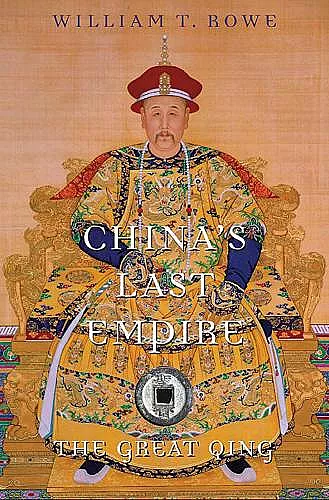China's Last Empire
The Great Qing
William T Rowe author Timothy Brook editor
Format:Paperback
Publisher:Harvard University Press
Published:10th Oct '12
Should be back in stock very soon

In a fine, well-written study, Rowe brings the latest scholarship in Qing history to a wide audience. This book reflects a lifetime of reading in the field, and is written in the fluent manner of an accomplished and very successful author. Responsible and judicious, it makes an important contribution to our understanding of Chinese history. -- R. Kent Guy, University of Washington
In a brisk revisionist history, William Rowe challenges the standard narrative of Qing China as a decadent, inward-looking state that failed to keep pace with the modern West. This original, thought-provoking history of China’s last empire is a must-read for understanding the challenges facing China today.
In a brisk revisionist history, William Rowe challenges the standard narrative of Qing China as a decadent, inward-looking state that failed to keep pace with the modern West.
The Great Qing was the second major Chinese empire ruled by foreigners. Three strong Manchu emperors worked diligently to secure an alliance with the conquered Ming gentry, though many of their social edicts—especially the requirement that ethnic Han men wear queues—were fiercely resisted. As advocates of a “universal” empire, Qing rulers also achieved an enormous expansion of the Chinese realm over the course of three centuries, including the conquest and incorporation of Turkic and Tibetan peoples in the west, vast migration into the southwest, and the colonization of Taiwan.
Despite this geographic range and the accompanying social and economic complexity, the Qing ideal of “small government” worked well when outside threats were minimal. But the nineteenth-century Opium Wars forced China to become a player in a predatory international contest involving Western powers, while the devastating uprisings of the Taiping and Boxer rebellions signaled an urgent need for internal reform. Comprehensive state-mandated changes during the early twentieth century were not enough to hold back the nationalist tide of 1911, but they provided a new foundation for the Republican and Communist states that would follow.
This original, thought-provoking history of China’s last empire is a must-read for understanding the challenges facing China today.
In a fine, well-written study, Rowe brings the latest scholarship in Qing history to a wide audience. This book reflects a lifetime of reading in the field, and is written in the fluent manner of an accomplished and very successful author. Responsible and judicious, it makes an important contribution to our understanding of Chinese history. -- R. Kent Guy, University of Washington
Here is a new narrative for Chinese history. It is based on the path-breaking scholarship of a small body of principally American scholars who have shown that after the non-Han Manchus conquered the Ming in 1644, traditional China was gradually replaced by something very different. This meant that the previous explanations, emanating from the Harvard school, led by the persuasive John King Fairbank, which emphasized a succession of essentially unchanging dynasties, must be abandoned...In short, as Professor Rowe sets out in this important book, "the inward-looking and hermetic Celestial Empire" has vanished and something far more interesting has come convincingly before us. -- Jonathan Mirsky * Times Literary Supplement *
A very fine book, drawing on the best new scholarship on this pivotal period in Chinese history. -- K. E. Stapleton * Choice *
This series on China, brilliantly overseen by Timothy Brook, is a credit to Harvard University Press. Above all, it encourages us to think of China in different ways. -- Jonathan Mirsky * Literary Review *
- Commended for PROSE Awards 2009
- Nominated for John K. Fairbank Prize in East Asian History 2010
ISBN: 9780674066243
Dimensions: unknown
Weight: unknown
368 pages